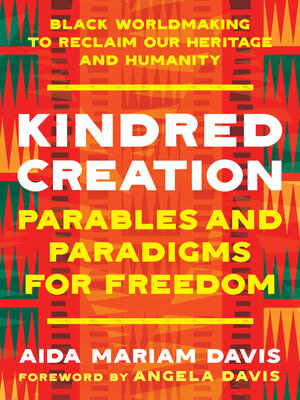Kindred Creation
ebook ∣ Parables and Paradigms for Freedom—Black worldmaking to reclaim our heritage and humanity
By Aida Mariam Davis

Sign up to save your library
With an OverDrive account, you can save your favorite libraries for at-a-glance information about availability. Find out more about OverDrive accounts.
Find this title in Libby, the library reading app by OverDrive.



Search for a digital library with this title
Title found at these libraries:
| Library Name | Distance |
|---|---|
| Loading... |
A vital path home. Employing African epistemologies and an embodied African beingness, this book embraces the revelation and miracle of Blackness.
Creating a world worthy of our children requires recalling the dignity and distinction of the African way of life.
This book is not written for settler consumption. Kindred Creation is a call and response to dream and design better worlds rooted in African lifeways: a path to Black freedom, a love letter to Black futures, and a blueprint to intergenerational Black joy and dignity—all (and always) on Black terms.
Author, organizer, and designer Aida Mariam Davis explores the historical and ongoing impacts of settler colonialism, making explicit the ways that extraction, oppression, and enslavement serve the goals of empire—not least by severing ancestral connections and disrupting profound and ancient relationships to self, nature, and community.
Structured in three parts—Remember, Refuse, and Reclaim—Kindred Creation is a philosophical guidebook and a vital invitation to power and reconnection. Davis employs parable, poetry, theory, memory, narrative, and prophecy to help readers:
Remember: By unforgetting the unending and cascading violence of settler colonialism and other forms of domination and exploring the ways that African land, language, lifestyle, and labor are stolen, distorted, and repackaged for colonial consumption to extract capital and sever ties to ancestral knowledge, lifeways, and dignity
Refuse: By rejecting and interrupting death-making institutions and relationships and choosing kinship and self-determination in the face of settler colonial violence
Reclaim: By revealing that freedom is within us—and within reach. Davis shares how the reader can birth new worlds and relationships and offers strategies for reclaiming land, language, lifestyle, and labor.
The colonial violence and dispossession of African land, language, and labor is inflicted intentionally—and by design. Reclaiming African lifeways and remembering what was forcibly forgotten must be by creation: a re-membering of our interconnectedness and kinship.
Creating a world worthy of our children requires recalling the dignity and distinction of the African way of life.
This book is not written for settler consumption. Kindred Creation is a call and response to dream and design better worlds rooted in African lifeways: a path to Black freedom, a love letter to Black futures, and a blueprint to intergenerational Black joy and dignity—all (and always) on Black terms.
Author, organizer, and designer Aida Mariam Davis explores the historical and ongoing impacts of settler colonialism, making explicit the ways that extraction, oppression, and enslavement serve the goals of empire—not least by severing ancestral connections and disrupting profound and ancient relationships to self, nature, and community.
Structured in three parts—Remember, Refuse, and Reclaim—Kindred Creation is a philosophical guidebook and a vital invitation to power and reconnection. Davis employs parable, poetry, theory, memory, narrative, and prophecy to help readers:
The colonial violence and dispossession of African land, language, and labor is inflicted intentionally—and by design. Reclaiming African lifeways and remembering what was forcibly forgotten must be by creation: a re-membering of our interconnectedness and kinship.







